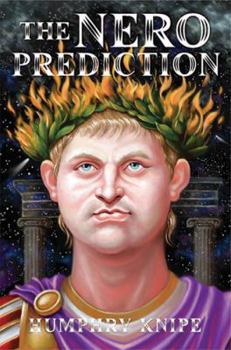The Nero Prediction
Select Format
Select Condition 
Book Overview
Agrippina, the emperor Claudius's niece, reads in the stars that Epaphroditus, a slave, is destined to help raise her son, the future emperor Nero, to the throne of the Caesars. Epaphroditus soon becomes Nero's confidant. Revolutionary unrest strikes Rome, a fiery comet makes a foreboding appearance and the young emperor makes a concert tour of Greece as enemies sprout like hydra's heads. Epaphroditus, fortified by the return of his faith in astrology, discovers that he, Nero's protector, is fated to kill his Caesar.
Format:Hardcover
Language:English
ISBN:0976082225
ISBN13:9780976082224
Release Date:November 2005
Publisher:Process
Length:280 Pages
Weight:1.45 lbs.
Dimensions:9.3" x 1.2" x 6.3"
Customer Reviews
4 ratings
Nero Gets It...
Published by Thriftbooks.com User , 19 years ago
After a long line of books on my reading shelf, I finally got the chance to sit down and read "The Nero Prediction". I was expecting a good, intelligent read and was delivered much more. Not only does Mr. Knipe engross the reader in a realistic historical setting, but the character development is entirely impressive. I felt like I walked hand-in-hand with each character throughout the narrative. The prose is rich and envelopes you in a lush, realistic environment where I found myself wanting to stay. I can't say which I'm more impressed with: the realism of feeling immersed in an ancient culture, or the intensive research that must have gone into creating the tone of the book. Nero delivers, and is nothing short of an impressive work of fiction.
A Very Enjoyable Page Turner
Published by Thriftbooks.com User , 20 years ago
I have always been a junkie for good historical fiction. Humphry Knipe did a splendid job of invoking a detailed and very real feeling Rome. The cat and mouse political intrigue described in this story will give you a terrifying view from the heights of Roman Aristocracy. I truly loved this book.
A Great Story of Ancient Rome
Published by Thriftbooks.com User , 20 years ago
A friend of mine who's a professor of Ancient Roman Studies suggested that I look at this book. He said that it was accurate historically. The fact that it's a novel could be misinterpreted since the author is adding dimension to the existing facts while trying to be accurate in his speculation. The result is a fascinating story. Nero was far more than simply the guy who played his harp while Rome burned. He was a great artist and actor and patron of the arts. He was treacherous as well and altogether an interesting and complex character.The dialogue is especially well written and authentic in tone.I don't know why I haven't heard of Humphry Knipe before this book. He's on the level of a Gore Vidal or Will Durant. Is he a screenwriter? Anyway I loved this book and recommend it to anyone who likes Ancient Rome and a great story based on facts.
Not your father's Nero
Published by Thriftbooks.com User , 20 years ago
I don't have a lot of time to read books. When I do it is usually nonfiction research related to my work in the entertainment field. It was in this capacity that I picked up "The Nero Prediction." Before immersing myself in its revelations, I held most of the common prejudices against the Emperor Nero gathered from movies and college history classes. Being of an iconoclastic nature, however, I was primed for this revisionist take on the Roman dictator, numerologically known by fundamentalist Christians of his day as 666, a.k.a. the Beast. From the advance publicity on the this book, it appears that Mr. Knipe set out to deliver a wild-and-wooly entertainment for mass consumption, yet researched enough to pass muster with antiquarians. He has succeeded on both fronts. With due diligence backing up his most daring assertions, he casts Nero as the greatest artist of his time--a master Thespian and musician, perhaps the first international pop star, not to mention the inventor of something very close to modern Opera. Think Elton John crossed with Pavarotti and John Belushi. Not a white-wash by any means, the author vividly reveals-if not revels in--Nero's debauchery and horrific crimes. However, he implies that the impish tyrant's worst offenses-i.e., ordering Christians to be torn apart by dogs and lit afire as living torches for the delight of the mob-occurred late in his reign, were inspired by the victims' own lust for martyrdom and were remarkable--in comparison to the atrocities of other Roman dictators--not for their cruelty but their theatricality. In his factual afterword, Mr. Knipe states that Nero's bad rap as a bloodthirsty libertine with no redeemable features, arose only after the historical records sympathetic to him were destroyed--along with his voluminous artistic masterpieces. This high crime against culture was perpetrated by the late monarch's ideological opponents, both Stoic and Christian. Prior to his demise, Nero was greatly loved by the Roman plebes for his free spirit, generosity, unprecedented public recitals, patriotism, anti-war stance and willingness to party hardy with the common man. It was these same characteristics which so infuriated the stingy, warmongering and pious Patricians, who constantly plotted his downfall. As for the fanatical, revolutionary Christ cult, it's likely that they would have hated and provoked whomever was on the throne. Knipe's book is also a groundbreaking study of the absolutely crucial role that astrology played in the affairs of the Roman aristocracy, who consulted their stars habitually in order to determine the best hour to marry their mother or murder their brother. They kept their birth times secret and their horoscopes locked away, so their enemies could not divine the perfect moment to intercede or retaliate. Astrology was hard science, and the concept of self-fulfilling prophecy was barely known. Their only reservations about following the advice of their persona





